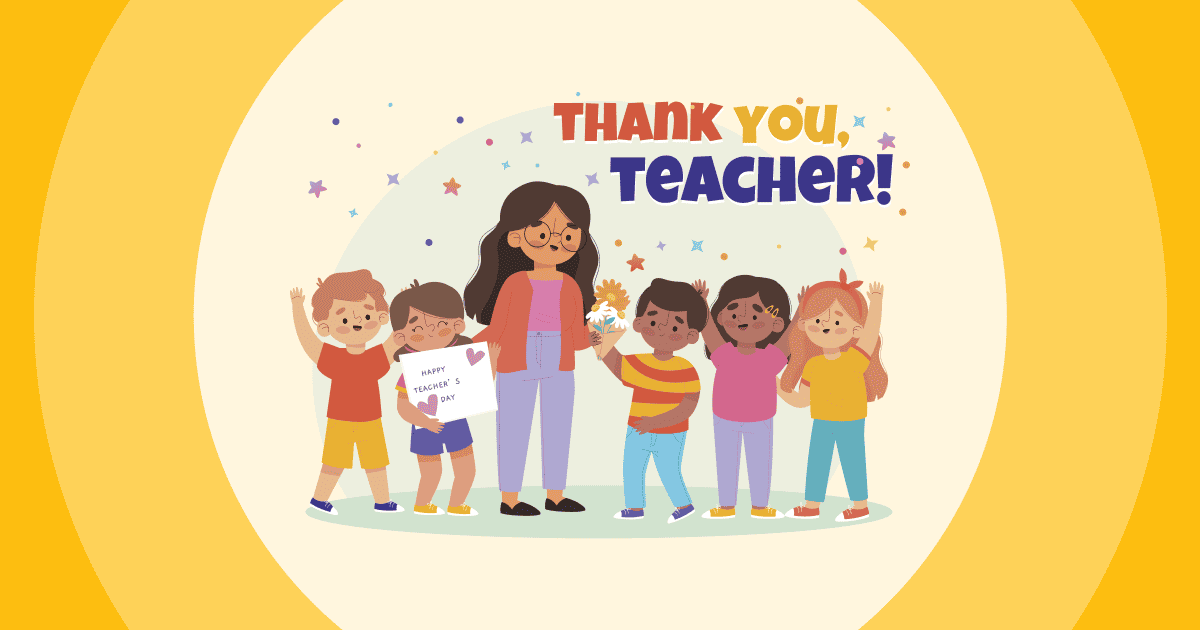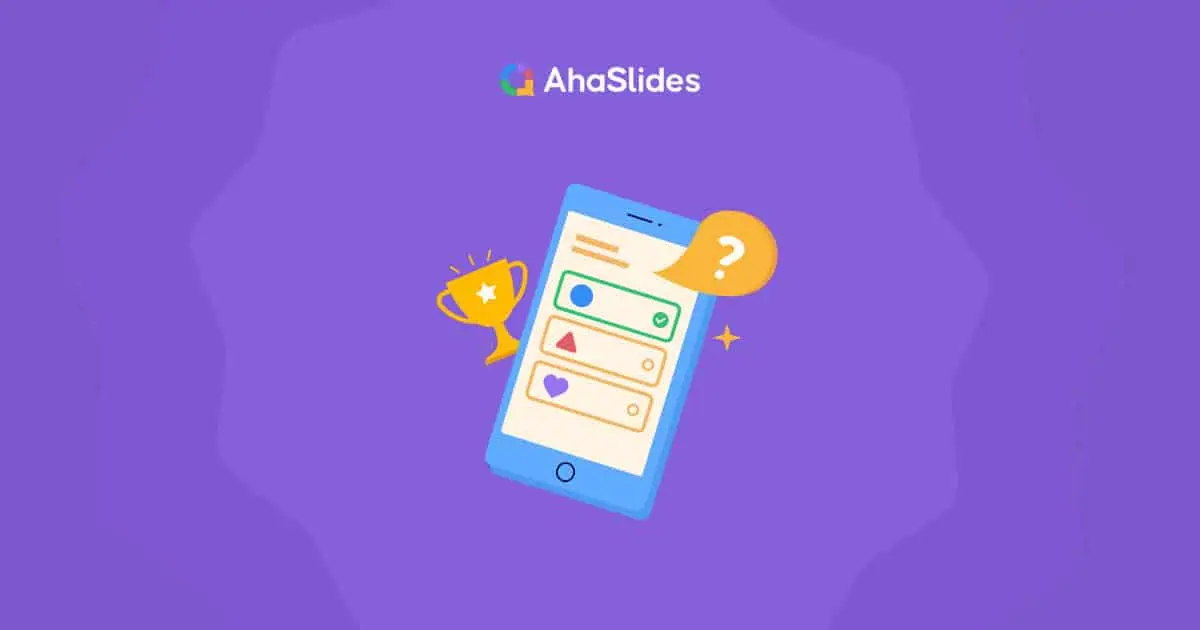Looking to create a fun and stress-free quiz for students while making them actually remember something?
Well, here we will look into why creating interactive quiz games in your class is the answer and how to bring one to life during lessons!

Table of Contents
The Power of Quizzes in Education
53% of students are disengaged from learning at school.
For a lot of teachers, the #1 problem at school is lack of student engagement. If students don't listen, they don't learn - it's really as simple as that.
The solution, however, isn't so simple. Turning disengagement into engagement in the classroom is no quick fix, but hosting regular live quizzes for students may be the incentive your learners need to start paying attention in your lessons.
So should we create quizzes for students? Of course, we should.
Here's why...
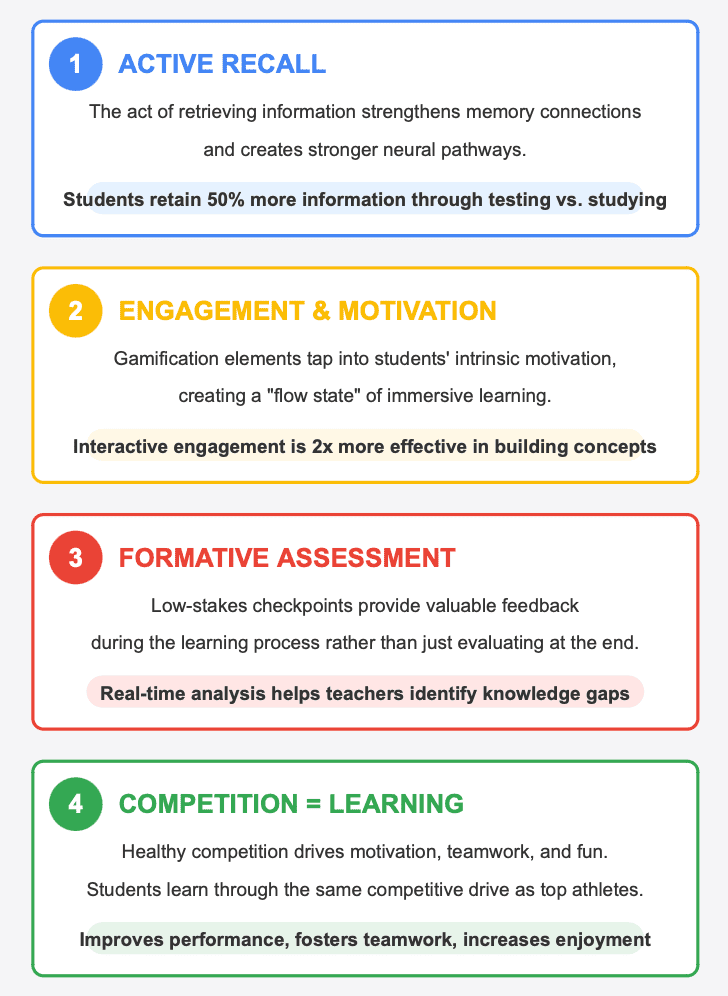
Active Recall and Learning Retention
Research in cognitive science has consistently shown that the act of retrieving information – known as active recall – significantly strengthens memory connections. When students participate in quiz games, they're actively pulling information from their memory rather than passively reviewing it. This process creates stronger neural pathways and substantially improves long-term retention.
According to a landmark study by Roediger and Karpicke (2006), students who were tested on material retained 50% more information a week later compared to students who simply restudied the material. Quiz games harness this "testing effect" in an engaging format.
Engagement and Motivation: The "Game" Factor
This straightforward concept has been proven since 1998, when Indiana University concluded that 'interactive engagement courses are, on average, more than 2x as effective in building basic concepts'.
The gamification elements inherent in quiz games – points, competition, immediate feedback – tap into students' intrinsic motivation. The combination of challenge, achievement, and fun creates what psychologists call a "flow state," where students become fully immersed in the learning activity.
Unlike traditional tests, which students often view as obstacles to overcome, well-designed quiz games foster a positive relationship with assessment. Students become active participants rather than passive test-takers.
Remember, you can (and should) make any subject interactive with students with the right kinds of activities. Student quizzes are fully participatory and encourage interactivity every second of the way.
Formative Assessment vs. Summative Pressure
Traditional summative assessments (like final exams) often create high-pressure situations that can impair student performance. Quiz games, on the other hand, excel as formative assessment tools – low-stakes checkpoints that provide valuable feedback during the learning process rather than merely evaluating at its conclusion.
With AhaSlides' real-time response analysis, teachers can instantly identify knowledge gaps and misconceptions, adjusting their instruction accordingly. This approach transforms assessment from a mere measurement tool into an integral part of the learning process itself.
Competition = Learning
Ever wondered how Michael Jordan could dunk with such ruthless efficiency? Or why Roger Federer has never left the upper echelons of tennis for two full decades?
These guys are some of the most competitive out there. They've learned everything they've gained in sports through the intense power of motivation through competition.
The same principle, though maybe not to the same degree, happens in classrooms every day. Healthy competition is a powerful driving factor for many students in acquiring, retaining and ultimately relaying information when called upon to do so.
A classroom quiz is so effective in this sense because it...
- improves performance due to inherent motivation to be the best.
- fosters teamwork skills if playing as a team.
- increases the level of fun.
So let's get into how to create quiz games for the classroom. Who knows, you may be responsible for the next Michael Jordan...
Defining "Quiz Game" in the Modern Classroom
Blending Assessment with Gamification
Modern quiz games strike a careful balance between assessment and enjoyment. They incorporate game elements like points, leaderboards, and competitive or collaborative structures while maintaining pedagogical integrity.
The most effective quiz games aren't simply tests with points attached – they thoughtfully integrate game mechanics that enhance rather than distract from the learning objectives.
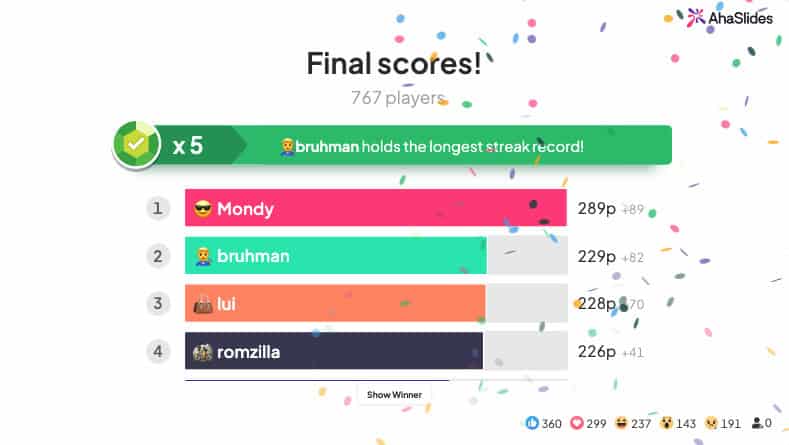
Digital vs. Analogue Approaches
While digital platforms like AhaSlides offer powerful features for creating interactive experiences, effective quiz games don't necessarily require technology. From simple flashcard races to elaborate classroom Jeopardy setups, analogue quiz games remain valuable tools, especially in environments with limited technological resources.
The ideal approach often combines both digital and analogue methods, leveraging the strengths of each to create diverse learning experiences.
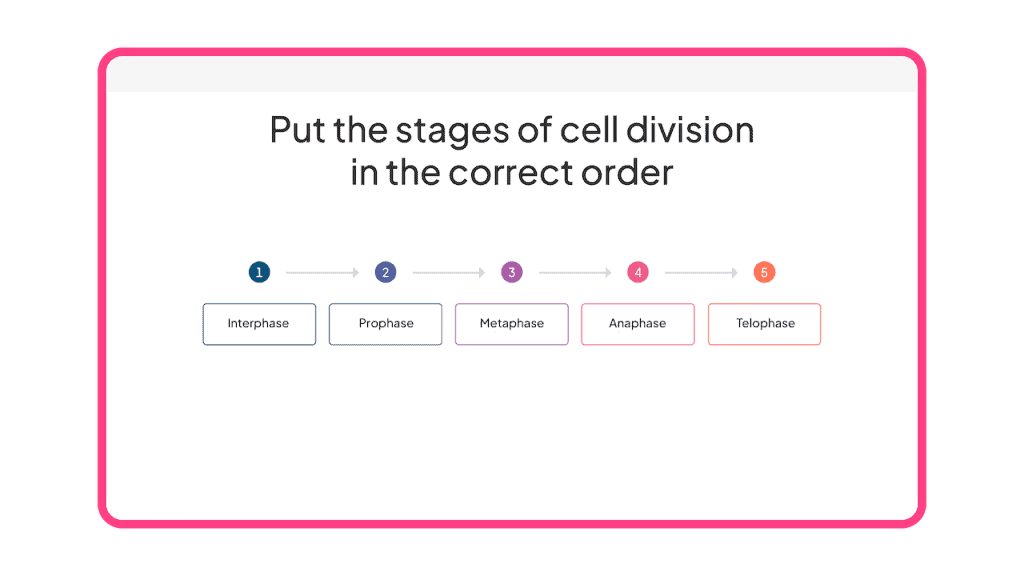
The Evolution of Quizzing: From Paper to AI
The quiz format has undergone remarkable evolution over the decades. What began as simple paper-and-pencil questionnaires has transformed into sophisticated digital platforms with adaptive algorithms, multimedia integration, and real-time analytics.
Today's quiz games can automatically adjust difficulty based on student performance, incorporate various media elements, and provide instant individualised feedback – capabilities that were unimaginable in traditional paper formats.
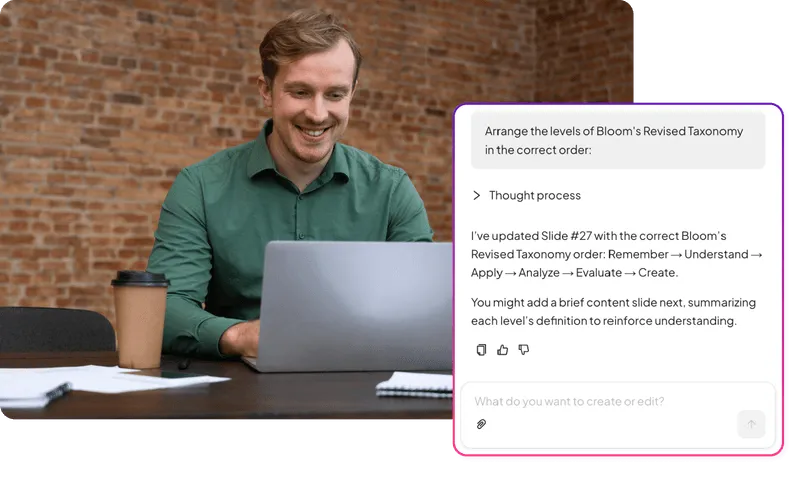
How to Create and Run Effective Quiz Games for Classrooms
1. Aligning Quizzes with Curriculum Goals
Effective quiz games are deliberately designed to support specific curriculum objectives. Before creating a quiz, consider:
- Which key concepts need reinforcement?
- What misconceptions need clarification?
- Which skills require practice?
- How does this quiz connect to broader learning goals?
While basic recall questions have their place, truly effective quiz games incorporate questions across multiple levels of Bloom's Taxonomy – from remembering and understanding to applying, analysing, evaluating, and creating.
Higher-order questions prompt students to manipulate information rather than simply recall it. For example, instead of asking students to identify the components of a cell (remembering), a higher-order question might ask them to predict what would happen if a specific cellular component malfunctioned (analysing).
- Remembering: "What is the capital of France?"
- Understanding: "Explain why Paris became the capital of France."
- Applying: "How would you use knowledge of Paris's geography to plan an efficient tour of the city's major landmarks?"
- Analysing: "Compare and contrast the historical development of Paris and London as capital cities."
- Evaluating: "Assess the effectiveness of Paris's urban planning for managing tourism and local needs."
- Creating: "Design an alternative transportation system that would address Paris's current urban challenges."
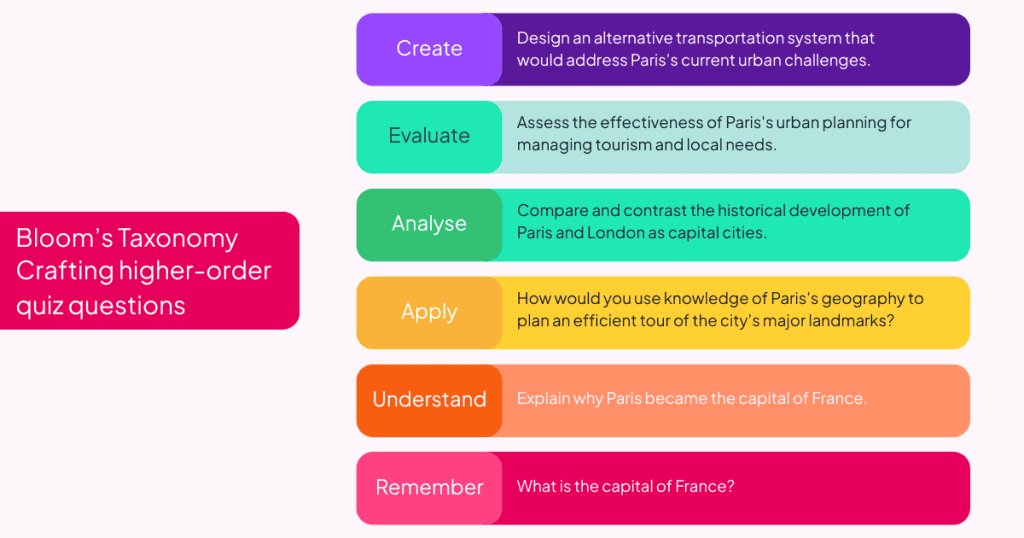
By incorporating questions at various cognitive levels, quiz games can stretch students' thinking and provide more accurate insights into their conceptual understanding.
2. Question Variety: Keeping It Fresh
Diverse question formats maintain student engagement and assess different types of knowledge and skills:
- Multiple Choice: Efficient for assessing factual knowledge and conceptual understanding
- True/False: Quick checks for basic comprehension
- Fill-in-the-Blank: Tests recall without providing answer options
- Open-Ended: Encourages elaboration and deeper thinking
- Image-Based: Incorporates visual literacy and analysis
- Audio/Video: Engages multiple learning modalities
AhaSlides supports all these question types, allowing teachers to create varied, multimedia-rich quiz experiences that maintain student interest while targeting diverse learning objectives.
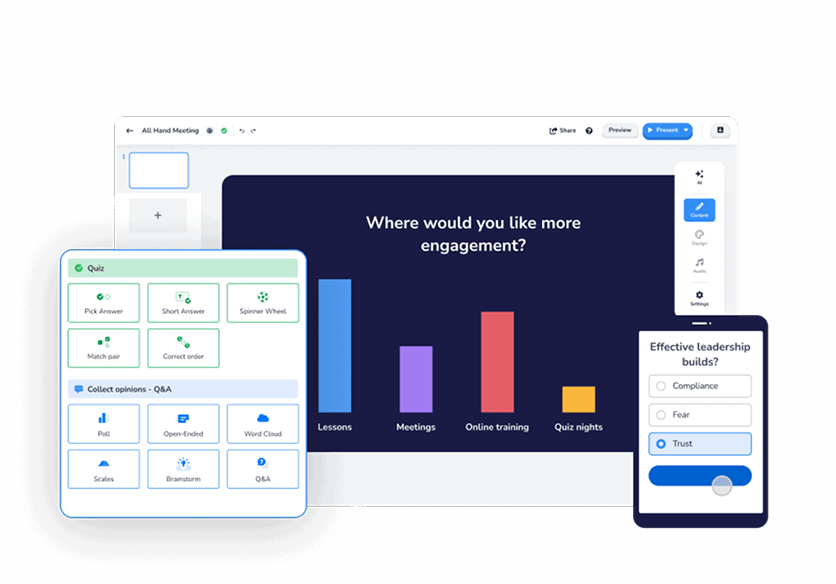
3. Time Management and Pacing
Effective quiz games balance challenges with achievable time constraints. Consider:
- How much time is appropriate for each question?
- Should different questions have different time allocations?
- How will pacing affect stress levels and thoughtful responses?
- What is the ideal total duration for the quiz?
AhaSlides allows teachers to customise the timing for each question, ensuring appropriate pacing for different question types and complexity levels.
Exploring Interactive Quiz Tools and Platforms
Comparison of Top Quiz Game Apps
AhaSlides
- Feature highlights: Live polling, word clouds, spinner wheels, customisable templates, team modes, and multimedia question types
- Unique strengths: User-friendly interface, exceptional audience engagement features, seamless presentation integration
- Pricing: Free plan available; premium features starting at $2.95/month for educators
- Best use cases: Interactive lectures, hybrid/remote learning, large group engagement, team-based competitions
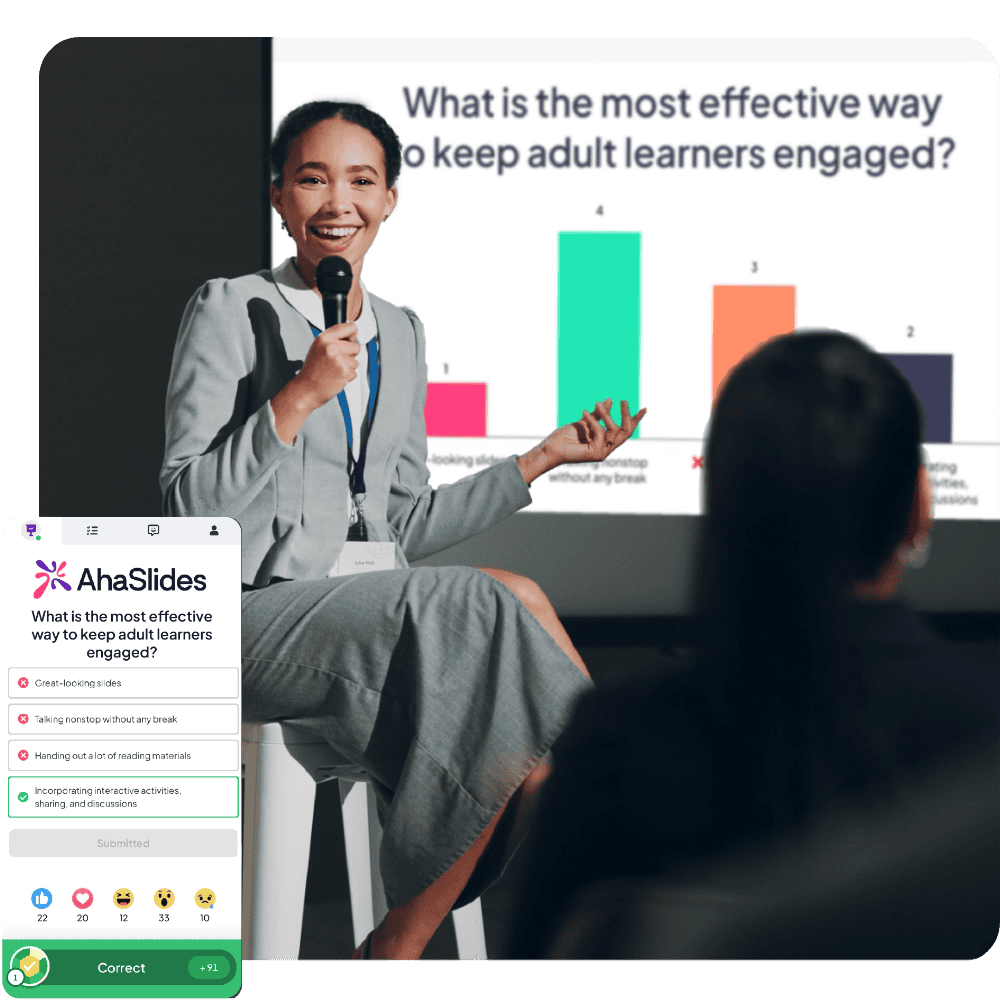
Competitors
- Mentimeter: Strong for simple polls but less gamified
- Quizizz: Self-paced quizzes with game elements
- GimKit: Focuses on earning and spending in-game currency
- Blooket: Emphasises unique game modes
While each platform has strengths, AhaSlides stands out for its balance of robust quiz functionality, intuitive design, and versatile engagement features that support diverse teaching styles and learning environments.
Leveraging Ed-tech Tools for Interactive Quizzes
Add-ins and integrations: Many educators already use presentation software like PowerPoint or Google Slides. These platforms can be enhanced with quiz functionality through:
- AhaSlides integration with PowerPoint and Google Slides
- Google Slides add-ons like Pear Deck or Nearpod
DIY techniques: Even without specialised add-ons, creative teachers can design interactive quiz experiences using basic presentation features:
- Hyperlinked slides that move to different sections based on answers
- Animation triggers that reveal correct answers
- Embedded timers for timed responses
Analogue Quiz Game Ideas
Technology isn't essential for effective quiz games. Consider these analogue approaches:
Adapting board games
- Transform Trivial Pursuit with curriculum-specific questions
- Use Jenga blocks with questions written on each piece
- Adapt Taboo to reinforce vocabulary without using certain "forbidden" terms
Classroom Jeopardy
- Create a simple board with categories and point values
- Have students work in teams to select and answer questions
- Use physical buzzers or raised hands for response management
Quiz-based scavenger hunts
- Hide QR codes linking to questions throughout the classroom or school
- Place written questions at different stations
- Require correct answers to progress to the next location
These analogue approaches are particularly valuable for kinesthetic learners and can provide a welcome break from screen time.
Integrating Quizzes with Other Learning Activities
Quizzes as Pre-Class Review
The "flipped classroom" model can incorporate quiz games as preparation for in-class activities:
- Assign brief content review quizzes before class
- Use quiz results to identify topics needing clarification
- Reference quiz questions during subsequent instruction
- Create connections between quiz concepts and in-class applications
This approach maximises classroom time for higher-order activities by ensuring students arrive with foundational knowledge.
Quizzes as Part of Project-Based Learning
Quiz games can enhance project-based learning in several ways:
- Use quizzes to assess prerequisite knowledge before beginning projects
- Incorporate quiz-style checkpoints throughout project development
- Create project milestones that include demonstration of knowledge through quiz performance
- Develop culminating quiz games that synthesise project learning
Quizzes for Review and Test Preparation
Strategic use of quiz games can significantly enhance test preparation:
- Schedule incremental review quizzes throughout the unit
- Create cumulative quiz experiences that mirror upcoming assessments
- Use quiz analytics to identify areas needing additional review
- Provide self-directed quiz options for independent study
AhaSlides' template library offers ready-made review quiz formats that teachers can customise for specific content.
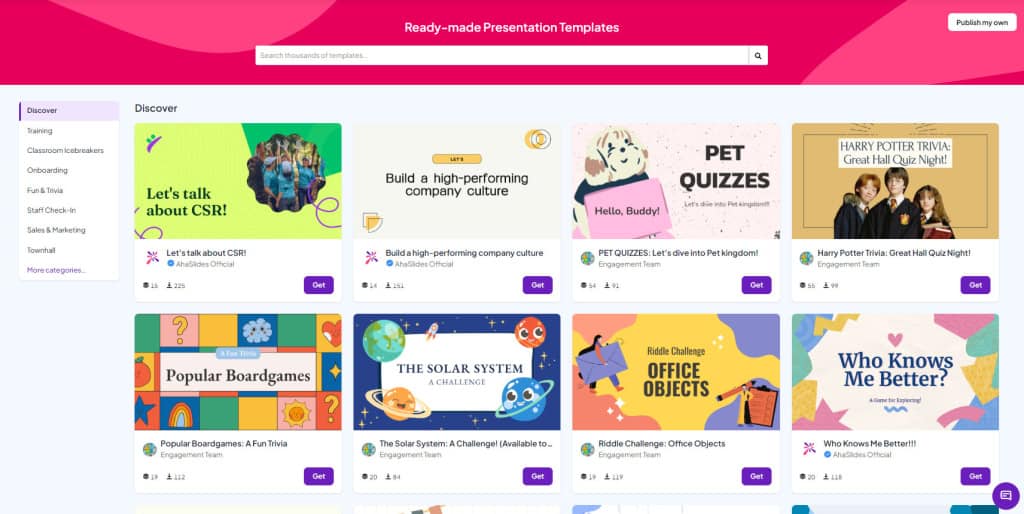
The Future of Quiz Games in Education
AI-Powered Quiz Creation and Analysis
Artificial intelligence is transforming educational assessment:
- AI-generated questions based on specific learning objectives
- Automated analysis of student response patterns
- Personalised feedback tailored to individual learning profiles
- Predictive analytics that forecast future learning needs
While these technologies are still evolving, they represent the next frontier in quiz-based learning.
Virtual Reality (VR) and Augmented Reality (AR) Quizzes
Immersive technologies offer exciting possibilities for quiz-based learning:
- Virtual environments where students physically interact with quiz content
- AR overlays that connect quiz questions to real-world objects
- 3D modeling tasks that assess spatial understanding
- Simulated scenarios that test applied knowledge in realistic contexts
Wrapping Up
As education continues to evolve, quiz games will remain an essential component of effective teaching. We encourage educators to:
- Experiment with different quiz formats and platforms
- Collect and respond to student feedback about quiz experiences
- Share successful quiz strategies with colleagues
- Continuously refine quiz design based on learning outcomes
⭐ Ready to transform your classroom with interactive quiz games? Sign up for AhaSlides today and get access to our complete library of quiz templates and engagement tools – free for educators!
References
Roediger, H. L., & Karpicke, J. D. (2006). Test-Enhanced Learning: Taking Memory Tests Improves Long-Term Retention. Psychological Science, 17(3), 249-255. https://doi.org/10.1111/j.1467-9280.2006.01693.x (Original work published 2006)
Indiana University. (2023). IEM-2b Course Notes.
Ye Z, Shi L, Li A, Chen C, Xue G. Retrieval practice facilitates memory updating by enhancing and differentiating medial prefrontal cortex representations. Elife. 2020 May 18;9:e57023. doi: 10.7554/eLife.57023. PMID: 32420867; PMCID: PMC7272192

